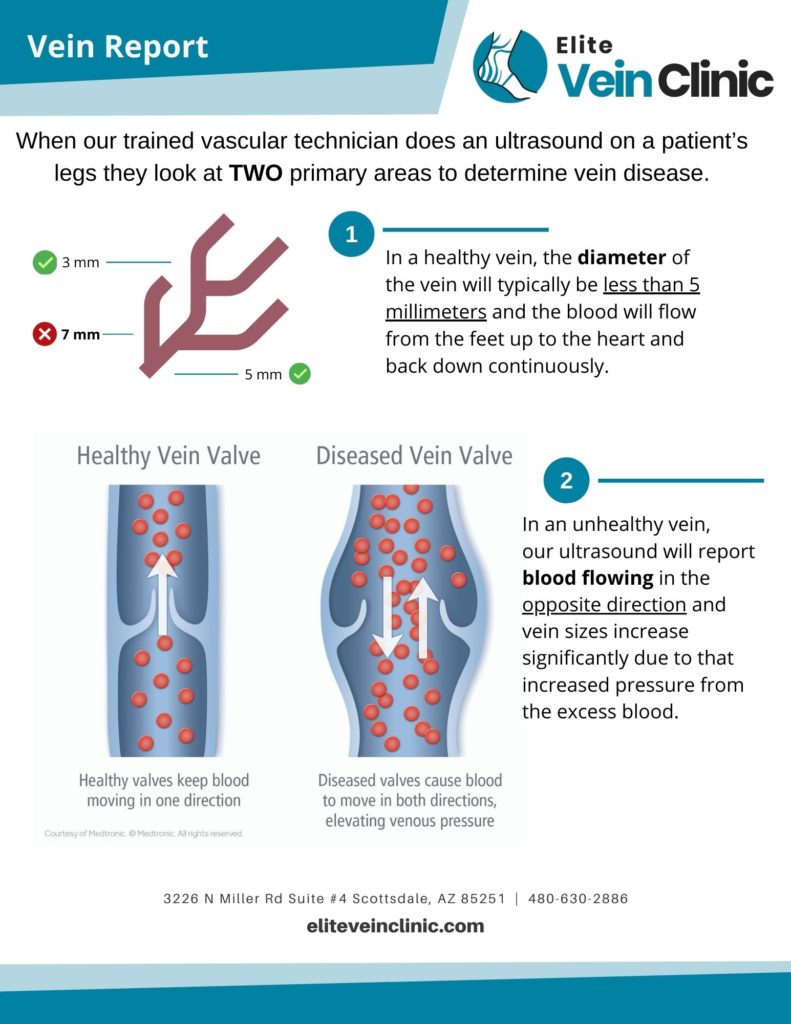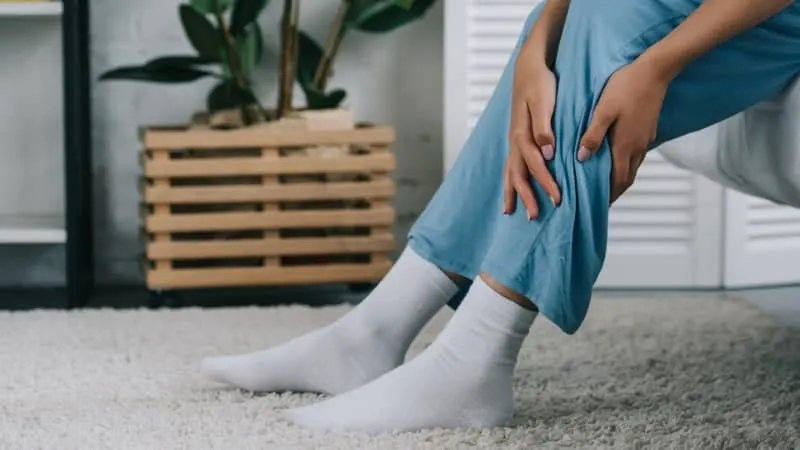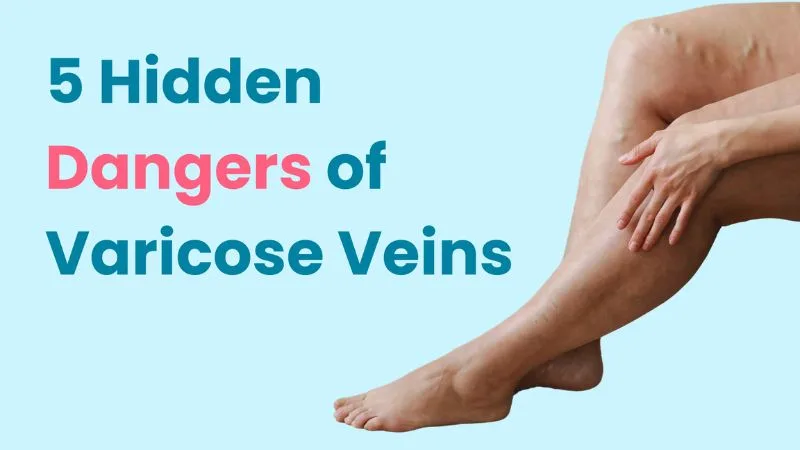If you’re suffering from leg discomfort, this will be the most important thing you read today.
- Leg discomfort
- Itching of the lower limbs
- Swelling
- Heaviness in the legs
- Throbbing & burning
- Worsened pain in the legs after prolonged sitting & standing
- Varicose veins
What causes these unwanted symptoms?
The answer is venous reflux.
Venous reflux, also known as chronic venous insufficiency, affects approximately 23% of individuals in the United States.
Here’s a quick video explaining it more in-depth.
This disease is often misunderstood & misdiagnosed with the following:
- Diabetes (color changes)
- Obesity
- CHF
- Renal disease
- Lymphedema
- Neuropathy
- Restless Leg Syndrome
This slows the time it takes for you to get the proper treatment.
If you suspect you have it, don’t worry! By reading this article, you will be informed about what to look for and how to get the proper treatment.
Let’s look at the top 3 signs of vein disease below.
Table of Contents
ToggleSign #1 Varicose Veins or Discoloration in Skin

Take a look at your legs.
Do you have veins that protrude from beneath your skin? This is a visual indicator that you may have vein disease.
Varicose veins are bulging veins, often bluish or purple. The smaller versions are called spider veins.
How does vein disease make you get these unsightly veins?
The answer is blood flow.
In your legs, you have two sets of veins. You have deep veins and superficial veins.
Deep veins are in the deeper part of the leg where the muscles are, and superficial veins are right under the skin.
In a normal person, the blood circulates from the feet towards the heart in both veins.
When someone has venous insufficiency, the blood will go up the deep veins and backward into the superficial vein.
The blood will start pooling in the superficial veins.
Since the superficial veins are closest to the skin, they will start to bulge and create varicose veins.
To spot this disease, a vein specialist will perform an ultrasound of your legs, examining the flow of your blood and the diameter of your vein.
See our basic infographic below to better understand the process.

Please Note: We often see patients who have had inadequate ultrasounds performed by other medical offices & specialists. This is because examining blood flow in your legs requires specialized training.
If you are experiencing these unwanted symptoms and have had an ultrasound before we highly recommend you seek a second opinion if the issues have not been resolved.
Sign #2 Legs Feel Like You’re Dragging Cinder Blocks

It’s not uncommon for your leg to feel tired and sore after a long day of activity or a strenuous workout.
What’s NOT normal is feeling frequently fatigued after light activity.
Picture this:
Coming back from a trip to the supermarket and feeling like you just walked through miles of snow.
What’s going on here?
Venous insufficiency goes much deeper than just the surface of the skin. It’s a plumbing problem that can stop you in your tracks.
When your legs suffer from a circulatory problem, blood begins to pool in your legs. This may cause your legs to feel heavier than normal. It can also cause itching, cramping, and aching.
Sign #3 Swelling Around Ankles and Legs

The ankles and legs are common sites of swelling because of gravity’s effect on the fluids in the human body. However, fluid retention from gravity isn’t the only cause of swollen ankles or legs.
It’s also one of the most common signs of vein disease.
Why is that?
Poor circulation in the legs is caused by faulty vein valves that do not pump the blood up towards the heart. This causes the blood to pool like a stagnant pond that results in swollen ankles and legs.
How to Eliminate Leg Pain?

Individuals with symptoms of venous insufficiency may have tried creams and compression socks. Unfortunately, these solutions are a temporary fix.
Here are some of the treatments that we do in our clinic that have long-lasting results and may solve the problem permanently.
Radiofrequency Ablаtіоn
A Mеdісаrе-apprоvеd, safe, minimally invasive procedure of removing varicose veins. RFA uses clean thermal energy inside the vein to gently close it off, leaving patients with little to no marks that heal quickly.
Non-Thermal Ablation
Non-thermal ablation (VenaSealTM) is a procedure that uses a medical adhesive delivered inside a diseased vein. The device is inserted into a diseased vein under ultrasound guidance.
Micro-Foam Sclerotherapy
An injectable foam treats varicose veins and more prominent diseased veins that worsen circulation. The foam is injected under ultrasound guidance in an outpatient setting.
Compounded Sclerotherapy
Compounded Sclerotherapy is a generic injectable foam administered to varicose veins with or without ultrasound guidance. This is often the treatment of choice for small varicose veins and spider veins.
Talk to your vein specialist to determine which treatment is best for you!
Why Elite Vein Clinic?

Elite Vein Clinic is the premier vein clinic in Arizona. We have successfully treated hundreds of patients and are confident we can resolve your symptoms.
Here are the things that make Elite Vein Clinic stand out among the rest:
- Family Feel: Our doctors, staff, and patients feel part of a family.
- Elite Quality Work: We only hire the best & perform well beyond industry standards.
- Safety: We don’t cut corners and use the latest and safest technology for treatments.
- Integrity: We tell it like it is. We don’t lie and put our patient’s health needs first.
- Customer Service: We go above and beyond to serve our patients.
Don’t just take our word for it. Listen to what some of our patients had to say:
So now that you got to know us, let us know YOU.
Don’t take another step with leg pain again. Be part of the success today!
Click ‘Get Started’ or give us a call now!



